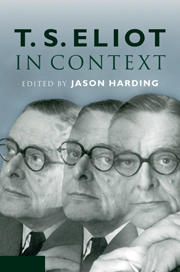Book contents
- Frontmatter
- Contents
- List of illustrations
- List of contributors
- Acknowledgements
- List of abbreviations
- Introduction
- PART ONE LIFE
- PART TWO FORMS
- PART THREE LITERARY CROSS-CURRENTS
- 16 Allusion: the case of Shakespeare
- 17 Classics
- 18 Dante
- 19 Seventeenth-century literature
- 20 Romantic and Victorian poetry
- 21 French poetry
- 22 Georgian poetry
- 23 Bloomsbury
- 24 Ezra Pound
- 25 The avant-garde
- PART FOUR POLITICS, SOCIETY AND CULTURE
- PART FIVE RECEPTION
- Further reading
- Index
20 - Romantic and Victorian poetry
Published online by Cambridge University Press: 05 August 2012
- Frontmatter
- Contents
- List of illustrations
- List of contributors
- Acknowledgements
- List of abbreviations
- Introduction
- PART ONE LIFE
- PART TWO FORMS
- PART THREE LITERARY CROSS-CURRENTS
- 16 Allusion: the case of Shakespeare
- 17 Classics
- 18 Dante
- 19 Seventeenth-century literature
- 20 Romantic and Victorian poetry
- 21 French poetry
- 22 Georgian poetry
- 23 Bloomsbury
- 24 Ezra Pound
- 25 The avant-garde
- PART FOUR POLITICS, SOCIETY AND CULTURE
- PART FIVE RECEPTION
- Further reading
- Index
Summary
In ‘Baudelaire’ (1930), Eliot describes the French poet as ‘Inevitably the offspring of romanticism, and by his nature the first counter-romantic in poetry’. Half-intimating that Baudelaire's cultural predicament was one shared by himself, Eliot continues: ‘It must not be forgotten that a poet in a romantic age cannot be a “classical” poet except in tendency’ (SE, 424). Eliot may have sometimes sounded as though he regarded literary history from Dante onwards as a long fall into a sundering apart of thought and feeling. But it might be claimed that, in doing so, he reprises in his own terms a major motif from William Blake's Prophetic Books, a reprise that typifies the strange meetings of apparent extremes in Eliot. For Eliot, ostensibly in revolt against nineteenth-century poetry, especially the work of the major Romantics (which receives the lion's share of attention in this chapter), is recognisably its heir.
THE ROMANTICS
In June 1918, Eliot wrote to his mother that, for the sake of their health, he and his wife Vivien were staying in Marlow, ‘a charming old little town, in the street where Shelley used to live’ (L1, 266). Eliot's poetry constructs and deplores modernist waste lands, and fiddles a post-symbolist whisper music, but it dwells among metaphorical places ‘where Shelley used to live’. And not just Shelley: roads leading into the Eliotic metropolis come from Blake, William Wordsworth, Samuel Taylor Coleridge, John Keats, Lord Byron and Thomas Lovell Beddoes.
- Type
- Chapter
- Information
- T. S. Eliot in Context , pp. 200 - 210Publisher: Cambridge University PressPrint publication year: 2011



